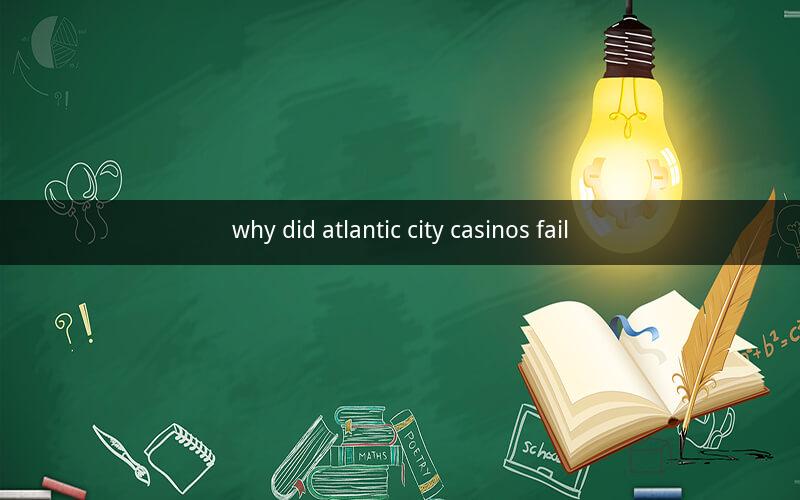
Table of Contents
1. Introduction to Atlantic City Casinos
2. The Rise of Atlantic City Casinos
3. Factors Contributing to the Failure
3.1 Economic Downturn
3.2 Competition from Other States
3.3 Declining Visitor Numbers
3.4 Poor Management and Marketing
3.5 Overreliance on Gambling Revenue
4. The Impact of Failure
5. Lessons Learned and Future Outlook
1. Introduction to Atlantic City Casinos
Atlantic City, once known as the Las Vegas of the East, was home to some of the most iconic casinos in the United States. The city's casinos played a significant role in the gaming industry, attracting millions of visitors annually. However, in recent years, these once-thriving establishments have faced numerous challenges, leading to their decline. This article explores the reasons behind the failure of Atlantic City casinos.
2. The Rise of Atlantic City Casinos
In the 1970s, New Jersey became the second state in the U.S. to legalize gambling, and Atlantic City was chosen as the epicenter of this new industry. The city's casinos quickly became a major tourist attraction, offering a wide range of gambling options, entertainment, and dining experiences. Over the next few decades, Atlantic City flourished, with new casinos constantly being built and existing ones expanding their facilities.
3. Factors Contributing to the Failure
3.1 Economic Downturn
The global economic recession that began in 2008 had a significant impact on the gaming industry, including Atlantic City. Many visitors cut back on spending, and the city's casinos saw a decrease in revenue. The economic downturn also led to a rise in unemployment, further affecting the local economy.
3.2 Competition from Other States
As neighboring states began to legalize gambling, Atlantic City faced increased competition. States like Pennsylvania, Delaware, and Maryland opened their own casinos, attracting a significant portion of the visitors who once flocked to Atlantic City. This competition eroded the city's market share and further impacted its revenue.
3.3 Declining Visitor Numbers
The combination of the economic downturn and increased competition led to a steady decline in visitor numbers. Many potential tourists chose to visit casinos in neighboring states or even overseas destinations, resulting in a significant decrease in foot traffic to Atlantic City.
3.4 Poor Management and Marketing
The management and marketing strategies employed by many Atlantic City casinos were outdated and ineffective. Some casinos failed to adapt to changing market trends and consumer preferences, while others invested heavily in marketing without seeing a return on their investment.
3.5 Overreliance on Gambling Revenue
Atlantic City casinos became overly dependent on gambling revenue, neglecting other potential sources of income. This overreliance left them vulnerable when faced with economic challenges and competition from other states.
4. The Impact of Failure
The failure of Atlantic City casinos has had a profound impact on the city and its residents. Many businesses and service industries that relied on the casinos for revenue have suffered, leading to job losses and increased unemployment. The city's tax base has also been depleted, making it difficult for local authorities to fund essential services.
5. Lessons Learned and Future Outlook
The decline of Atlantic City casinos serves as a cautionary tale for the gaming industry. It highlights the importance of diversifying revenue streams, adapting to changing market conditions, and investing in effective management and marketing strategies. While the future of Atlantic City may seem uncertain, there are signs of hope. Some casinos have begun to revitalize their offerings, and the city is exploring new ways to attract visitors.
Q&A
1. Q: What was the primary factor that led to the decline of Atlantic City casinos?
A: The primary factor was the combination of the economic downturn, increased competition from neighboring states, and poor management and marketing strategies.
2. Q: How did the economic recession of 2008 impact Atlantic City casinos?
A: The recession led to a decrease in visitor numbers and spending, significantly impacting the casinos' revenue.
3. Q: What were some of the neighboring states that began to compete with Atlantic City casinos?
A: Pennsylvania, Delaware, and Maryland were among the states that opened casinos, attracting visitors away from Atlantic City.
4. Q: How did the decline of Atlantic City casinos affect the local economy?
A: The decline led to job losses, increased unemployment, and a depletion of the city's tax base.
5. Q: What lessons can the gaming industry learn from the failure of Atlantic City casinos?
A: The industry can learn the importance of diversifying revenue streams, adapting to market trends, and investing in effective management and marketing.
6. Q: Are there any signs of recovery for Atlantic City casinos?
A: Yes, some casinos have begun to revitalize their offerings, and the city is exploring new ways to attract visitors.
7. Q: How has the competition from neighboring states affected Atlantic City's gaming industry?
A: The competition has significantly reduced Atlantic City's market share and visitor numbers.
8. Q: What role did poor management and marketing play in the decline of Atlantic City casinos?
A: Poor management and marketing strategies left many casinos unable to adapt to changing market conditions and consumer preferences.
9. Q: How has the decline of Atlantic City casinos impacted the city's reputation?
A: The decline has tarnished the city's reputation as a premier gaming destination.
10. Q: What steps can Atlantic City take to regain its position as a leading gaming destination?
A: Atlantic City can focus on diversifying its offerings, improving its marketing strategies, and attracting a wider range of visitors.